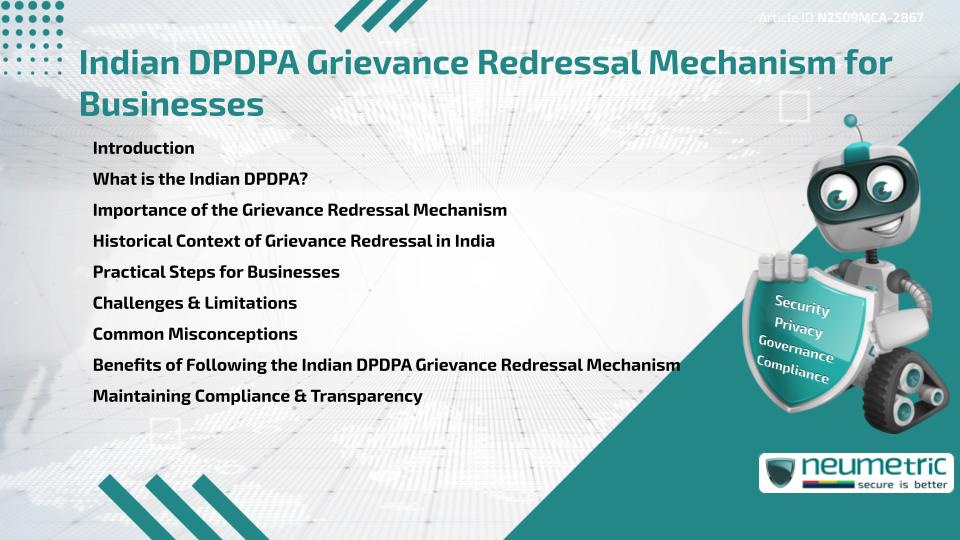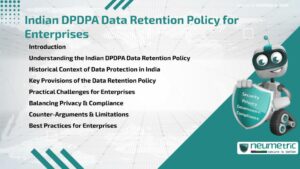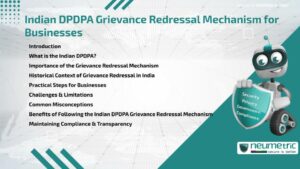Table of Contents
ToggleIntroduction
The Indian DPDPA Grievance Redressal mechanism is a key requirement for businesses under the Digital Personal Data Protection Act [DPDPA]. It mandates Enterprises to establish transparent, fair & efficient systems for addressing complaints from individuals regarding the handling of their Personal Data. This ensures businesses respect Data Privacy rights while enhancing Accountability. Understanding its structure, practical steps & challenges is crucial for Compliance & Customer Trust.
What is the Indian DPDPA?
The Digital Personal Data Protection Act [DPDPA] is India’s primary law governing digital Personal Data. It lays down obligations for Enterprises (called Data Fiduciaries) & rights for Individuals (called Data Principals). The Grievance Redressal mechanism ensures that individuals have a way to raise concerns, seek corrections or challenge improper handling of their data.
Importance of the Grievance Redressal Mechanism
The Indian DPDPA Grievance Redressal mechanism ensures individuals are not left powerless in the digital age. By requiring businesses to handle complaints effectively, it:
- Strengthens Trust between Businesses & Consumers
- Provides individuals with recourse if their data is mishandled
- Helps businesses identify & correct internal lapses
This mechanism acts like a Customer service desk, but specifically for data-related concerns.
Historical Context of Grievance Redressal in India
Grievance Redressal systems are not new in India. From Consumer courts to Corporate ombudsmen, mechanisms have long existed to protect citizens. However, Digital Privacy complaints lacked a robust structure. The DPDPA fills this Gap, drawing inspiration from international Frameworks like the EU’s General Data Protection Regulation [GDPR], while tailoring rules to India’s unique context.
Practical Steps for Businesses
To implement the Indian DPDPA Grievance Redressal mechanism, businesses should:
- Designate a Grievance Officer & publish their contact details.
- Establish an internal system to track & respond to complaints.
- Set clear timelines for resolution, as mandated by the Act.
- Provide escalation pathways if individuals are not satisfied.
- Document all grievances & resolutions for Audit purposes.
Think of it like a railway complaints desk: a structured, accessible & accountable process for addressing passenger (in this case, Data Principal) concerns.
Challenges & Limitations
Businesses may face difficulties in:
- Allocating resources to manage grievances effectively
- Handling high complaint volumes
- Coordinating across departments to resolve data-related issues
Moreover, Compliance does not eliminate all disputes. Some grievances may escalate to the Data Protection Board, which has the authority to intervene.
Common Misconceptions
- “Only large companies need Grievance Redressal”: The mechanism applies to all Enterprises handling Personal Data.
- “Grievance Redressal is optional”: It is a mandatory requirement under the DPDPA.
- “Responding once is enough”: Ongoing monitoring & improvements are essential for Compliance.
Benefits of Following the Indian DPDPA Grievance Redressal Mechanism
By complying, businesses can:
- Build stronger Customer loyalty through Trust
- Reduce Risks of Penalties & Regulatory intervention
- Gain insights into operational weaknesses
- Align with global Best Practices in Customer engagement & Accountability
It works like a safety valve-releasing pressure before problems escalate into bigger conflicts.
Maintaining Compliance & Transparency
To sustain compliance, businesses should:
- Regularly review Grievance Redressal Procedures
- Train Employees on complaint handling
- Publish annual Reports on Grievance statistics
- Encourage Feedback to improve processes
These actions create a culture of Transparency & Accountability, which is essential in the digital economy.
Conclusion
The Indian DPDPA Grievance Redressal mechanism ensures Individuals can raise concerns & Businesses remain Accountable. By establishing robust systems, Enterprises can balance Regulatory Compliance with Customer Trust.
Takeaways
- The Indian DPDPA Grievance Redressal mechanism is mandatory for all businesses.
- It strengthens Trust & Accountability in Data Handling.
- Proper systems require grievance officers, timelines & escalation paths.
- Misconceptions must be corrected for effective Compliance.
- Continuous Monitoring sustains Transparency.
FAQ
What is the Indian DPDPA Grievance Redressal mechanism?
It is a mandatory system requiring businesses to handle complaints related to Personal Data under the DPDPA.
Who must implement this mechanism?
All Enterprises processing digital Personal Data must have a Grievance Redressal system.
What is the role of a Grievance Officer?
The officer is responsible for receiving, addressing & resolving complaints within specified timelines.
What happens if grievances are not resolved?
Unresolved grievances may be escalated to the Data Protection Board for Review & Action.
Is Grievance Redressal optional for Small Businesses?
No, the mechanism is mandatory regardless of business size.
How quickly must businesses resolve complaints?
Timelines are defined by the Act & businesses must adhere strictly to them.
How can businesses maintain compliance?
They should regularly Audit Grievance Procedures, Train staff & maintain Transparent records.
Need help for Security, Privacy, Governance & VAPT?
Neumetric provides organisations the necessary help to achieve their Cybersecurity, Compliance, Governance, Privacy, Certifications & Pentesting needs.
Organisations & Businesses, specifically those which provide SaaS & AI Solutions in the Fintech, BFSI & other regulated sectors, usually need a Cybersecurity Partner for meeting & maintaining the ongoing Security & Privacy needs & requirements of their Enterprise Clients & Privacy conscious Customers.
SOC 2, ISO 27001, ISO 42001, NIST, HIPAA, HECVAT, EU GDPR are some of the Frameworks that are served by Fusion – a SaaS, multimodular, multitenant, centralised, automated, Cybersecurity & Compliance Management system.
Neumetric also provides Expert Services for technical security which covers VAPT for Web Applications, APIs, iOS & Android Mobile Apps, Security Testing for AWS & other Cloud Environments & Cloud Infrastructure & other similar scopes.
Reach out to us by Email or filling out the Contact Form…





